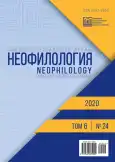The fate of borrowings in Russian language (to the history of the word partisan)
- Authors: Volotov D.A.1
-
Affiliations:
- Moscow Aviation Institute (National Research University)
- Issue: Vol 6, No 24 (2020)
- Pages: 653-659
- Section: РУССКИЙ ЯЗЫК
- URL: https://journal-vniispk.ru/2587-6953/article/view/302828
- DOI: https://doi.org/10.20310/2587-6953-2020-6-24-653-659
- EDN: https://elibrary.ru/VSUMJU
- ID: 302828
Cite item
Full Text
Abstract
We analyze the semantics and usage of French borrowing of military partisan themes from the moment it entered Russian at the turn of the XVII–XVIII centuries to the present time. We give an etymological and historical analysis of the word, and consider the evolution of its semantics in Russian language due to the functional diversity of its use both in the donor language and in the recipient language. The study of lexeme history in cultural and historical terms helps to trace the development of the form and meaning of the word partisans and its derivatives, the peculiarities of its functioning as a representative of battle vocabulary sphere in Russian language. We conclude that the sememe is completely borrowed from the French language into the Russian literary language in terms of its form (phonetics, grammar, peculiarities of word usage) and meaning. We indicate and analyze in detail the sources of word study in the synchronous-diachronic aspect, lexicographic, documentary-historical, and artistic-textual sources both on the material of the modern Russian literary language and in the previous periods of its development, and we identify the transformation of its semantic structure. We pay attention to the disclosure of the extensional value of the word in the text of Leo Tolstoy’s epic novel “War and Peace”, which is the most valuable source for studying the lexical and semantic system of Russian language of the pre-Pushkin era. A number of examples from different spheres of the modern usus of Russian language show changes in the functional and stylistic coloration of the word and the acquisition of enantiosemicity features and other additional shades by the word. We conclude that the word partisan is adapted as an element of the battle term system of Russian language and that its use in modern conditions of conducting combat operations is inevitably fading away, turning it into historicism.
Keywords
About the authors
D. A. Volotov
Moscow Aviation Institute (National Research University)
Author for correspondence.
Email: vadmit87@mail.ru
ORCID iD: 0000-0002-0665-1555
Candidate of Philology, Senior Lecturer of Foreign Languages for Physics, Mathematics and Engineering Department
Russian Federation, 4 Volokolamskoe Highway, GSP-3, A-80, Moscow 125993, Russian FederationReferences
- Bulakhovskiy L.A. Kurs russkogo literaturnogo yazyka [Course of the Russian Literary Language]. Kharkiv, Radyansk school Publ., 1937, 328 p. (In Russian).
- Uspenskiy B.A. Kratkiy ocherk istorii russkogo literaturnogo yazyka (XI–XIX vv.) [A Short Essay on the History of the Russian Literary Language (XI–XIX centuries)]. Moscow, Gnosis Publ., 1994, 240 p. (In Russian).
- E Lin. Novaya zaimstvovannaya leksika v russkom yazyke kak faktor dinamiki yazykovoy kartiny mira: dis. … kand. filol. nauk [New Borrowed Vocabulary in Russian as a Factor in the Dynamic of the Language Picture of the World. Cand. philol. sci. diss.]. Tambov, 2018. (In Russian).
- Birzhakova E.E., Voynova L.A., Kutina L.L. Ocherki po istoricheskoy leksikologii russkogo yazyka XVIII veka. Yazykovyye kontakty i zaimstvovaniya [Essays on the Historical Lexicology of the Russian Language of the 18th century. Language Contacts and Borrowing]. Leningrad, Nauka Publ., 1972, 431 p. (In Russian).
- Ozhegov S.I., Shvedova N.Y. Tolkovyy slovar’ russkogo yazyka [Explanatory Dictionary of Russian Language]. Moscow, ITI Technology, 2006, 944 p. (In Russian).
- Evgenyevoy A.P. (ed.). Slovar’ russkogo yazyka: v 4 t. [Dictionary of the Russian Language: in 4 vols.]. Moscow, Russian Language Publ., 1985–1988. (In Russian).
- Kuznetsov S.A. (complier and ed.-in-chief). Bol’shoy tolkovyy slovar’ russkogo yazyka [The Great Explanatory Dictionary of the Russian Language]. St. Petersburg, Norint Publ., 2000, 1536 p. (In Russian).
- Fasmer M. Etimologicheskiy slovar’ russkogo yazyka: v 4 t. [Etymological Dictionary of the Russian Language: in 4 vols.]. Moscow, Progress Publ., 1986. (In Russian).
- Le Petit Robert. Dictionnaire alphabétique et analogique de la langue française. Paris, Dictionnaires le Robert Publ., 1984, 2172 p. (In French).
- Tolstoy L.N. Voyna i mir: v 2 kn. [War and Peace: in 2 bks]. Moscow, 2010, bk 1, 2. (In Russian).
- Novitskogo V.F. and others (eds.). Voyennaya entsiklopediya [Military Encyclopedia]. St. Petersburg, Ivan Sytin’s Printing House, 1911–1915. (In Russian).
- Volotov D.A. Batal’naya leksika frantsuzskogo proiskhozhdeniya v russkom yazyke pervoy poloviny XIX veka (na materiale romana-epopei L.N. Tolstogo «Voyna i mir»): dis. … kand. filol. nauk [Battle Vocabulary of French Origin in Russian in the First Half of the 19th century (based on the Epic Novel by Leo Tolstoy “War And Peace”). Cand. philol. sci. diss.]. Yaroslavl, 2014. (In Russian).
- Plekhov A.M. (complier). Slovar’ voyennykh terminov [Dictionary of Military Terms]. Moscow, Voenizdat Publ., 1988, 335 p. (In Russian).
Supplementary files









